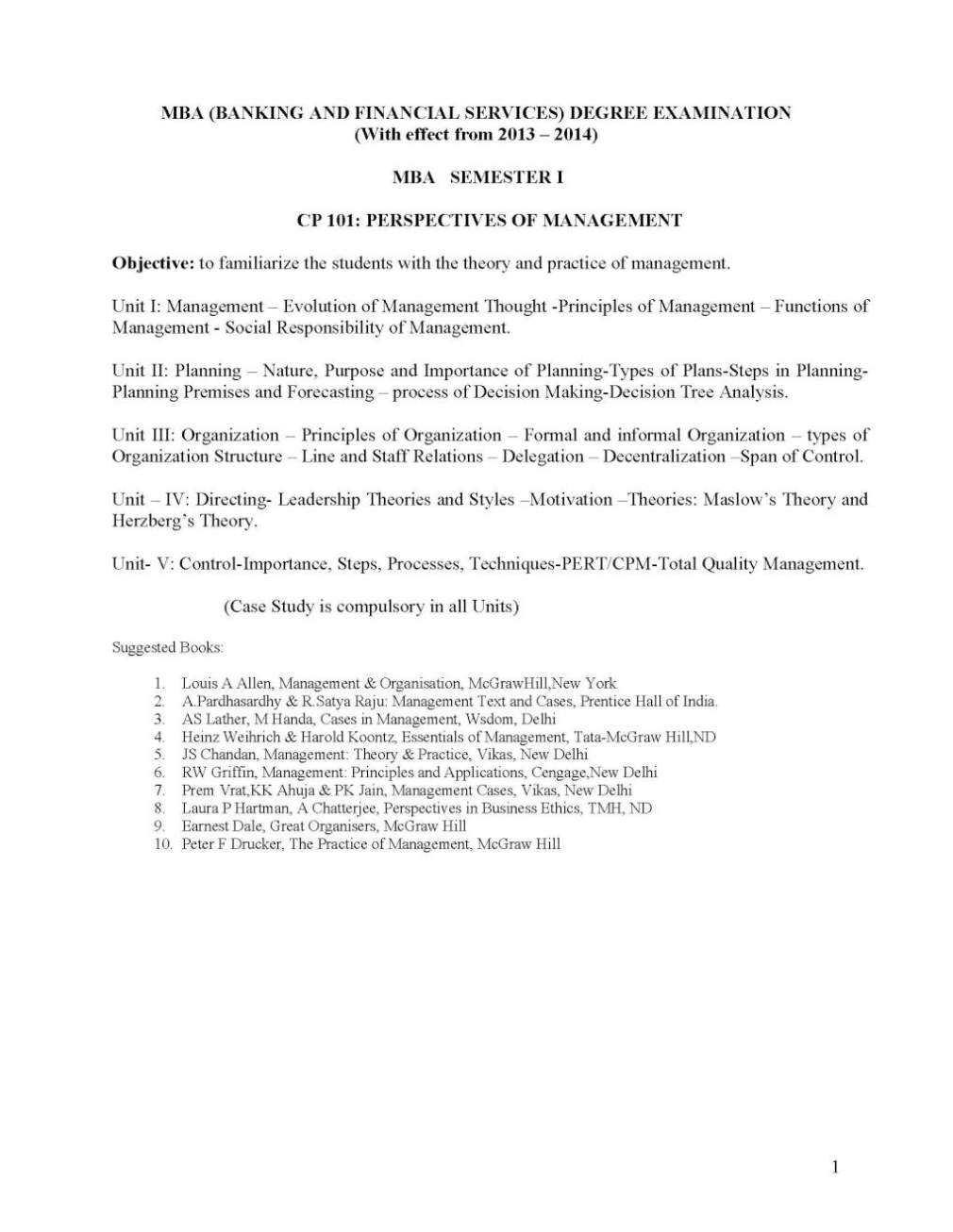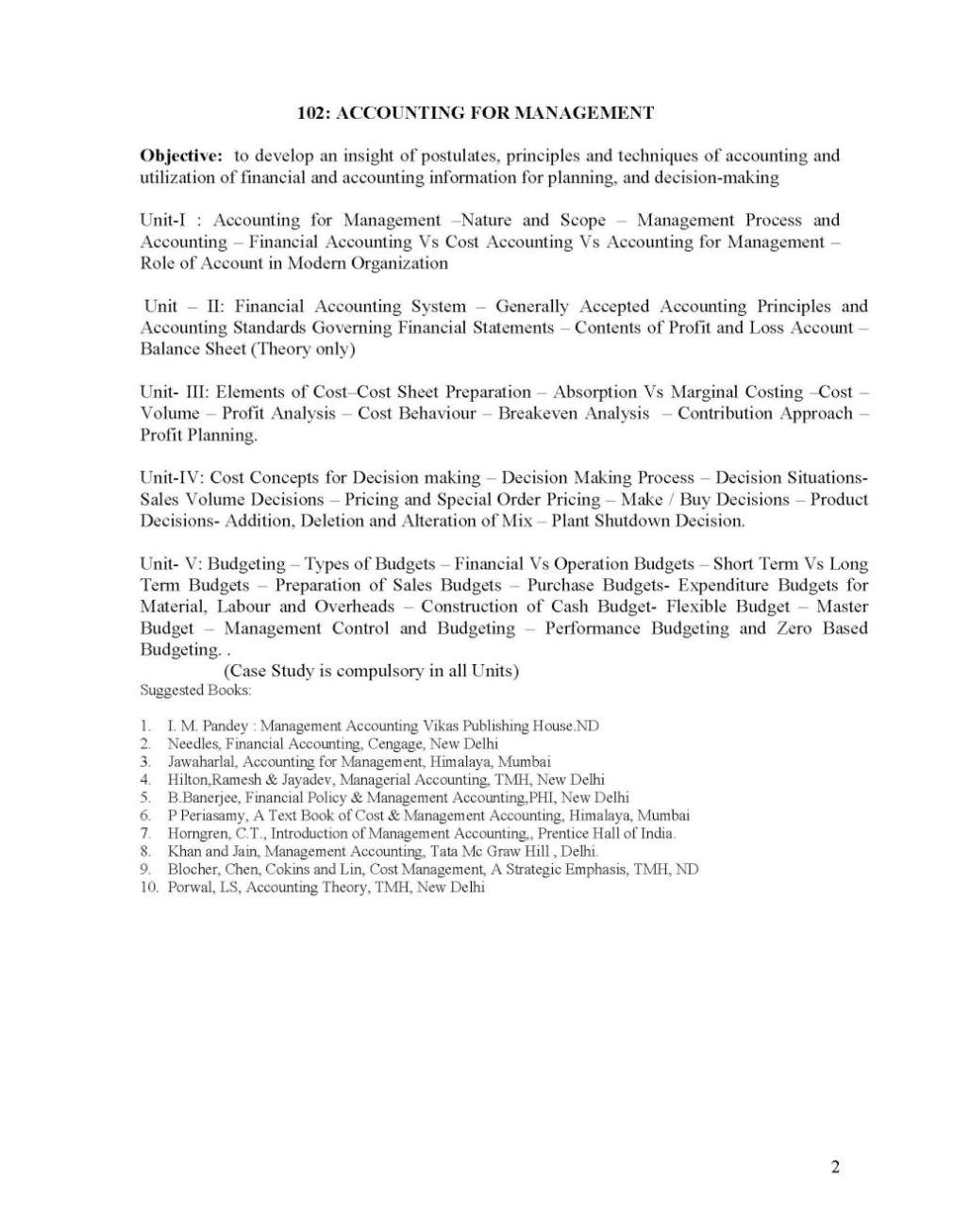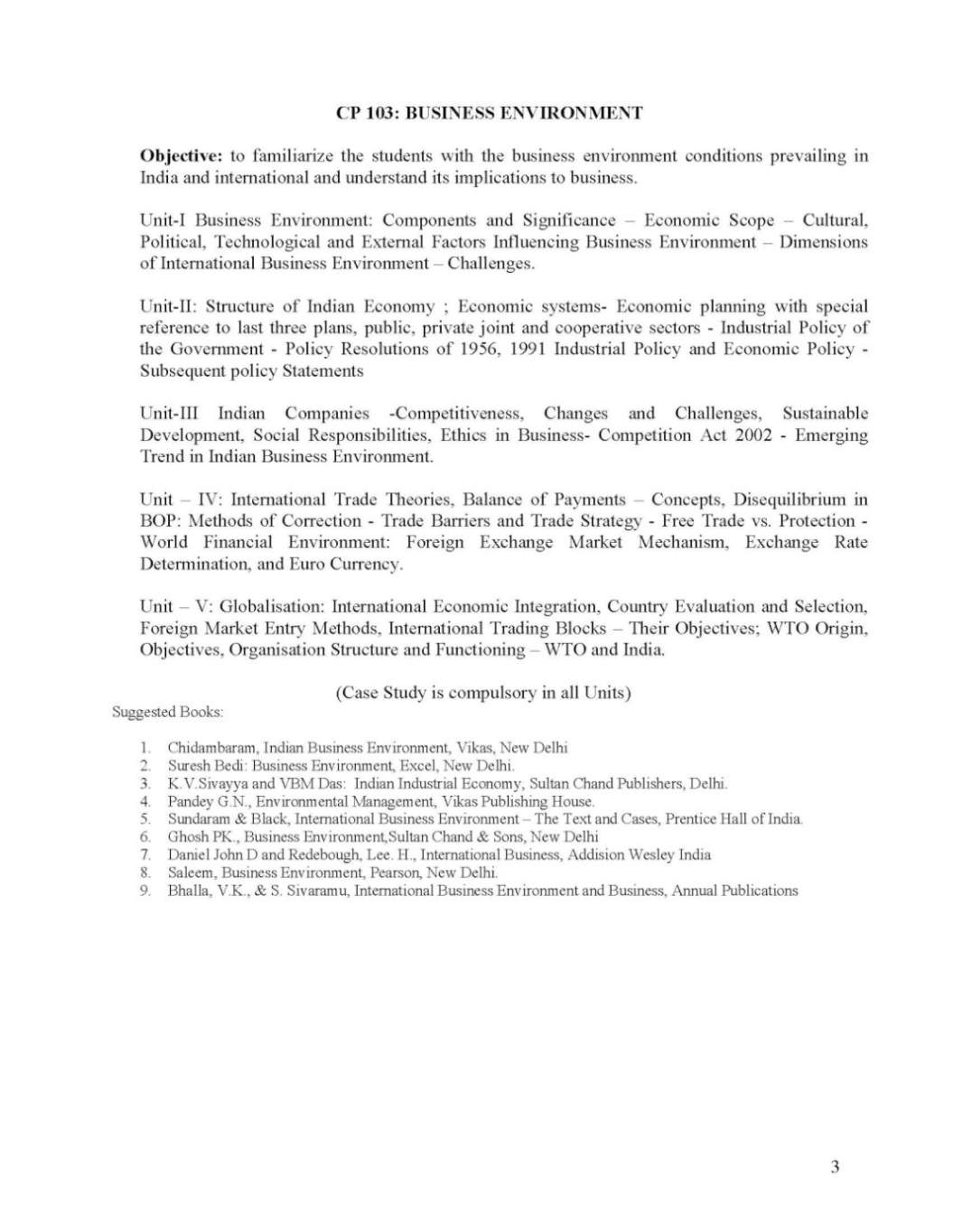|
#2
19th August 2015, 09:22 AM
| |||
| |||
| Re: AUMSN PG Centre Andhra University
AUMSN PG Centre Andhra University was established back in the month of November 1977 and it lies on the East coast in the East Godavari District, Andhra Pradesh, India. Courses Offered: M.A. English M.A. Politics M.A. Public Administration M.A. Economics M.B.A. M.H.R.M. M.C.A. M.Phil. (Full Time and Part Time) Ph.D. (Full Time and Part Time) Departments: Department of English Department of Politics & Public Administration Department of MBA Department of Economics Department of MCA Here for your reference I am giving you the syllabus of MBA of BANKING AND FINANCIAL SERVICES: Semester 1: PERSPECTIVES OF MANAGEMENT: Unit I: Management – Evolution of Management Thought -Principles of Management – Functions of Management - Social Responsibility of Management. Unit II: Planning – Nature, Purpose and Importance of Planning-Types of Plans-Steps in Planning Planning Premises and Forecasting – process of Decision Making-Decision Tree Analysis. Unit III: Organization – Principles of Organization – Formal and informal Organization – types of Organization Structure – Line and Staff Relations – Delegation – Decentralization –Span of Control. Unit – IV: Directing- Leadership Theories and Styles –Motivation –Theories: Maslow’s Theory and Herzberg’s Theory. Unit- V: Control-Importance, Steps, Processes, Techniques-PERT/CPM-Total Quality Management. Suggested Books: 1. Louis A Allen, Management & Organisation, McGrawHill,New York 2. A.Pardhasardhy & R.Satya Raju: Management Text and Cases, Prentice Hall of India. 3. AS Lather, M Handa, Cases in Management, Wsdom, Delhi 4. Heinz Weihrich & Harold Koontz, Essentials of Management, Tata-McGraw Hill,ND 5. JS Chandan, Management: Theory & Practice, Vikas, New Delhi 6. RW Griffin, Management: Principles and Applications, Cengage,New Delhi 7. Prem Vrat,KK Ahuja & PK Jain, Management Cases, Vikas, New Delhi 8. Laura P Hartman, A Chatterjee, Perspectives in Business Ethics, TMH, ND 9. Earnest Dale, Great Organisers, McGraw Hill 10. Peter F Drucker, The Practice of Management, McGraw Hill ACCOUNTING FOR MANAGEMENT: Unit-I : Accounting for Management –Nature and Scope – Management Process and Accounting – Financial Accounting Vs Cost Accounting Vs Accounting for Management – Role of Account in Modern Organization Unit – II: Financial Accounting System – Generally Accepted Accounting Principles and Accounting Standards Governing Financial Statements – Contents of Profit and Loss Account –Balance Sheet (Theory only) Unit- III: Elements of Cost–Cost Sheet Preparation – Absorption Vs Marginal Costing –Cost – Volume – Profit Analysis – Cost Behaviour – Breakeven Analysis – Contribution Approach – Profit Planning. Unit-IV: Cost Concepts for Decision making – Decision Making Process – Decision Situations Sales Volume Decisions – Pricing and Special Order Pricing – Make / Buy Decisions – Product Decisions- Addition, Deletion and Alteration of Mix – Plant Shutdown Decision. Unit- V: Budgeting – Types of Budgets – Financial Vs Operation Budgets – Short Term Vs Long Term Budgets – Preparation of Sales Budgets – Purchase Budgets- Expenditure Budgets for Material, Labour and Overheads – Construction of Cash Budget- Flexible Budget – Master Budget – Management Control and Budgeting – Performance Budgeting and Zero Based Budgeting. Suggested Books: 1. I. M. Pandey : Management Accounting Vikas Publishing House.ND 2. Needles, Financial Accounting, Cengage, New Delhi 3. Jawaharlal, Accounting for Management, Himalaya, Mumbai 4. Hilton,Ramesh & Jayadev, Managerial Accounting, TMH, New Delhi 5. B.Banerjee, Financial Policy & Management Accounting,PHI, New Delhi 6. P Periasamy, A Text Book of Cost & Management Accounting, Himalaya, Mumbai 7. Horngren, C.T., Introduction of Management Accounting,, Prentice Hall of India. 8. Khan and Jain, Management Accounting, Tata Mc Graw Hill , Delhi. 9. Blocher, Chen, Cokins and Lin, Cost Management, A Strategic Emphasis, TMH, ND 10. Porwal, LS, Accounting Theory, TMH, New Delhi BUSINESS ENVIRONMENT: Unit-I Business Environment: Components and Significance – Economic Scope – Cultural, Political, Technological and External Factors Influencing Business Environment – Dimensions of International Business Environment – Challenges. Unit-II: Structure of Indian Economy ; Economic systems- Economic planning with special reference to last three plans, public, private joint and cooperative sectors - Industrial Policy of the Government - Policy Resolutions of 1956, 1991 Industrial Policy and Economic Policy - Subsequent policy Statements Unit-III Indian Companies -Competitiveness, Changes and Challenges, Sustainable Development, Social Responsibilities, Ethics in Business- Competition Act 2002 – Emerging Trend in Indian Business Environment. Unit – IV: International Trade Theories, Balance of Payments – Concepts, Disequilibrium in BOP: Methods of Correction - Trade Barriers and Trade Strategy - Free Trade vs. Protection - World Financial Environment: Foreign Exchange Market Mechanism, Exchange Rate Determination, and Euro Currency. Unit – V: Globalisation: International Economic Integration, Country Evaluation and Selection, Foreign Market Entry Methods, International Trading Blocks – Their Objectives; WTO Origin, Objectives, Organisation Structure and Functioning – WTO and India. Suggested Books: 1. Chidambaram, Indian Business Environment, Vikas, New Delhi 2. Suresh Bedi: Business Environment, Excel, New Delhi. 3. K.V.Sivayya and VBM Das: Indian Industrial Economy, Sultan Chand Publishers, Delhi. 4. Pandey G.N., Environmental Management, Vikas Publishing House. 5. Sundaram & Black, International Business Environment – The Text and Cases, Prentice Hall of India. 6. Ghosh PK., Business Environment,Sultan Chand & Sons, New Delhi 7. Daniel John D and Redebough, Lee. H., International Business, Addision Wesley India 8. Saleem, Business Environment, Pearson, New Delhi. 9. Bhalla, V.K., & S. Sivaramu, International Business Environment and Business, Annual Publications MANAGERIAL ECONOMICS: Unit I- Introduction: Nature and Scope of Managerial Economics; Objectives of the Firm-Traditional Theory, Sales and Revenue Maximizing Theories, Managerial Theories and Behavioral Theories; Profit Maximization. Vs. Wealth Maximization. Unit II- Demand Analysis : Demand-Meaning, Determinations Of Demand, Demand Function; Law of Demand; Elasticity of Demand –Price, Income, Cross and Promotional or Advertising Elasticity of demand, Managerial Uses of Elasticity of Demand; Demand Forecasting. Demand Forecasting Methods for Existing and New Products, Criteria for Good Forecasting Method. Unit III- Production Analysis: Production Function –Law of Variable Proportions, Isoquant and Isocost Curves, Least Cost Combination, and Returns to Scale; Economies of Large Scale; CobbDouglas Production Function and Constant Elasticity of Substitution - Production Function; Cost concepts and Cost Oriented Pricing Methods. Unit-IV Market Analysis: Price and Output Determination under Perfect Competition; Profit Meaning and Profit Theories-Profit Planning-Measurement. Unit – V: Economic Optimization: Economic Problems and Optimization Techniques – Unconstrained and Constrained Optimization; Unbounded Maxim – Optimization of Functions of One Variable and Optimization with Multivariate Function; Suggested Books: 1. Dean,Joel: Managerial Economics, PHI., New Delhi 2. DN Dwidvedi, Managerial Economics, Vikas, New Delhi 3. Trivedi M.L: Managerial Economics, Theory and Applications, TMH,ND 4. Mark Hirschey, Managerial Economics: An Integrative Approach, Cengage, New Delhi 5. Mehta, P.L: Managerial Economics, Text and Csaes, S.Chand & Co 6. Mittal A., . Managerial Economics, Text and Csaes, Wisdom, Delhi 7. Mithani, D.M: Managerial Economics, Theory and Applications, Himalaya Publishing. 8. Attmanad; Managerial Economics, Excel publications. 9. G.S.Gupa, Macro Economics: , Theory and Applications, Tata McGraw Hill. 10. Dwivedi, D.N. Macro Economics: Theory and Applications, Tata McGraw Hill MANAGERIAL COMMUNICATION SKILLS: Unit – I : Role of Communication in Business – Objective of Communication – The Process of Human Communication – Media of Communication, Written Communication – Oral Communication – Visual Communication, Audio Visual Communication – Silence – Developing Listening Skills – Improving Non–verbal Communication kills – Understanding Cultural Effects of Communication. Unit – II: Managing Organization Communication - formal and Informal Communication- Intra and Personal Communication – Models for Inter Personal Communication – Exchange Theory, Johari Window and Transactional Analysis. Unit-III: Managing Motivation to Influence Interpersonal Communication – Inter-Personal Perception – Role of Emotion in Inter Personal Communication- Communication Styles – Barriers of Communication – Gateways to Effective Interpersonal Communication Unit-IV: Business Writing Skills – Significance of Business Correspondence, Essentials of Effective Business Correspondence, Business Letter and Forms, Oral Presentations – Meetings, Telephone Communication – Use of Technology in Business Communication, E-mail Messages. Unit-V: Report Writing – Meaning and Significance; Structure of Reports; Negative, Persuasive and Special Reporting; Informal Report – Proposals; Formal Reports; Organization of Press Report. Suggested Books: 1. K Bhardwaj, Professional Communication, IK Int Pub House, New Delhi 2. Krizan, Merrier, Logan and Williams, Effective Business Communications, Cengage, New Delhi 3. HC Gupta, SG Telang, Business Communication, Wisdom, Delhi 4. Penrose, Business Communication for Managers, Cengage, New Delhi 5. McGrath, Basic Managerial Skills for All 5th ed., Prentice Hall of India. 6. Urmila Rai & S.M. Rai, Business Communication, Himalya Publishers, 7. Meenalshi Raman—Business Communication Oxford University Press. 8. Lesikar I Flatley, Basic Business Communication, Tata McGraw Hill. ORGANISATIONAL BEHAVIOUR: Unit-I: Meaning and scope of OB-Challenges and opportunities – Foundations of Individual behaviour, values, attitude, job satisfaction, personality, perception and emotions. Unit – II: Motivation-Theories, Group dynamics – Leaderships styles.. Unit –III: Organizational conflict-causes and consequences-conflict and Negotiation. Unit-IV: Organisational change, change process resistance to change and Organisational Development Unit – V Organisational Culture-Creating an Ethical Organisation-Managing Stress-Organisational Effectiveness. Suggested Books: 1. Udai Pareek, Organizational Behaviour, Oxford University Press. 2. Karam Pal, Management Process and Organisational Behavioujr, IK Int Pub Hourse,ND 3. Moorhead & Griffin, Introduction to Organizational Behaviour, Cengage, New Delhi 4. Arun Kumar and Meenakshi, Orgnisational Behaviour, Vikas, ND 5. Fred Luthans, Organisational Behaviour, McGraw Hill, New Delhi 6. RK.Suri, Organizational Behaviour, Wisdom Publication 7. Aswathappa K, Organisational Behaviour, Himalaya, Mumbai 8. Neeraj Kumar, Organisational Behaviour, Prentice Hall QUANTITATIVE TEACHNIQUES FOR MANAGEMENT: Unit-I: Functions, Linear, Quadratic, Logarithmic and Exponential Functions- Permutations and Combinations – Matrices - Solving System of Equations with Matrix Methods – Differentiation and Integration of Simple Functions and their Applications. Unit – II: Measures of Central Tendency – Measures of Dispersion –Simple Correlation and Regression Analysis – Concept and Applications of Multiple Regressions. Unit –III: Concept of Probability- Probability Rules – Joint and Marginal Probability – Baye’s Theorem- Probability Distributions- Binomial, Poisson, Normal and Exponential Probability Distributions. Unit-IV: Sampling and Sampling Distributions – Estimation – Point and Interval Estimates of Averages and proportions of small and Large Samples –Concepts of Testing Hypothesis –One Sample Test for Testing Mean and Proportion of Large and Small Samples. Unit – V: Tests Two Samples –Tests of Difference between Mean and Proportions of Small and Large Samples – Chi-square Test of Independence and Goodness of Fitness- Analysis of Variance. Suggested Books: 1. K.V.Sivayya and K.Satya Rao Business Mathematics 2. Anderson, Quantitative Methods for Business, Cengage, ND 3. Nagar, Das – Busic Statistics, Oxford University press 4. CR Kothari, Quantative Techniques, Vikas, ND 5. Shenoy, Sarma and Srivatsava, Quantitative Techniques for Management, New Age,ND 6. N.D.Kothari, Quantitative Techniques, in Management, Tata McGraw Hill, 2001. 7. S.P.Gupta Statistical Methods for Management 8. Anand Sharma, Quantitative Techniques for Decision Making, Himalaya, Mumbai II SEMESTER: MARKETING MANAGEMENT: Unit – I Importance and Scope of Marketing: Concepts of Marketing; Marketing Management Tasks; Marketing Environment; Marketing and Customer Value – Industrial Marketing, Services Marketing, Global Marketing. Unit –II: Marketing Information System and Marketing Research; Consumer Behaviour and Buying Decision Process – Organization Buyer Behaviour – Market Segmentation and Targeting. Unit – III: Development of Marketing Offerings Strategy – New Product Development– Product line and Decisions–Product-mix–Product Differentiation – Product Life Cycle Management - Brand Management - Packaging. Unit – IV: Pricing Strategies and Programs; Setting the Price – Adapting the Price – Initiating Response to Price Changes - Delivering Value: Designing and Managing Value Networks – Channels of Distribution. Unit – V: Communicating Value: Designing and Managing Marketing Communications – Advertising – Direct Marketing and Personal Selling – Sales Promotion – Events and Public Relations and Public Relations : Competitive Marketing Strategies- Emerging Trends in Marketing: Networking Marketing-Viral Marketing-Ambush/Guerilla Marketing-Green Marketing-Direct Marketing etc. Suggested Books 1. Kotler,Keller,Koshy & Jha, Marketing Management, Pearson, New Delhi 2. William J Stanton, Fundamentals of Marketing, McGraw-Hill, New Delhi. 3. Arun Kumar and Meenakshi, Marketing Management, Vikas, New Delhi 4. Pride and Ferrell, Marketing Management: Planning,Implementation & Control, Cengage, ND 5. Rajan Sexena, Marketing Management: Text cases in Indian Context. 6. Keith Blois - Oxford Textbook of Marketing Oxford University Press. 7. Zinkota & Kotabe : Maketing Management , Prentice Hall of India. 8. Joel R.Evans & Barry Berman : Marketing, Wiley India, New Delhi.    For more detailed information I am uploading a PDF file which is free to download: Contact Details: Andhra University Waltair Junction, CBM Compound Vishakhapatnam, Andhra Pradesh 530003 India [MAP]Andhra University Vishakhapatnam Andhra Pradesh[/MAP] Last edited by Shaleen; 19th August 2015 at 09:28 AM. |
